Dr.Teruo Higa’s
Living A Dream
- 2025
- Apr:#204 How EM Use Has Spread Throughout the Philippines
- Mar:#203 How to Use EM to Fundamentally Solve the Problem of Agricultural Residue Burning
- Feb:#202 The Spread of EM technology in Germany
- Jan:#201 The 2nd Ichiro Masaki Memorial Universal Village EM International Conference
- Jan:#200 Cleanup of the Ala Wai Canal in Hawaii, where social bonds are strengthened using EM
- 2024
- Nov:#199 EM trials in India with bananas, tomatoes, and pomegranates
- Oct:#198 The Steadily Evolving EM Nature Farming Method at the Blue Sky Palace - Part 8
- Sep:#197 The Steadily Evolving EM Nature Farming Method at the Blue Sky Palace - Part 7
- Aug:#196 The Steadily Evolving EM Nature Farming Method at the Blue Sky Palace - Part 6
- Jul:#195 The Steadily Evolving EM Nature Farming Method at the Blue Sky Palace - Part 5
- Jun:#194 Steadily Evolving EM Nature Farming Method at the Blue Sky Palace - Part 4
- May:#193 Steadily Evolving EM Nature Farming Method at the Blue Sky Palace - Part 3
- May:#192 Steadily Evolving EM Nature Farming Method at the Blue Sky Palace - Part 2
- Apr:#191 Steadily Evolving EM Nature Farming Method at the Blue Sky Palace
- Mar:#190 Quantum Mechanical Effects of EM Gravitron Charcoal
- Mar:#189 The barrier space in Okinawa (Ryukyu Islands) has risen to another dimension
- Jan:#188 Sixty Days after Typhoon No.6
- 2023
- Oct:#187 Supermassive Typhoon No.6 and Subsequent Typhoon No. 11
- Sep:#186 Massive Typhoon No.6 that swallowed the Ryukyu Islands Graviton barrier
- Sep:#185 August 8th is World “EM Mudball Day”
- Aug:#184 A disease-free life depends on the health of the intestinal microbiome.
- Jul:#183 Trial and Error at the Blue-Sky Palace, Part 3
- Jun:#182 Trial and Error at the Blue-Sky Palace, Part 2
- Apr:#181 Trial and Error at the Blue-Sky Palace
- Mar:#180 Ala Wai Canal Cleanup Project in Waikiki, Hawaii
- Feb:#179 High-Yield, High-Quality Rice Production Using EM
- Feb:#178 The Progress the "Soil Preparation Workshop" of the Oishi 3-chan Club (Part 2)
- Jan:#177 Organic Farming Instructional Manual Using EM
- 2022
- Nov:#176 The Typhoon Situation in Okinawa in 2022
- Sep:#175 Third-Party Verification of the Graviton barrier in Okinawa Part-2
- Sep:#174 Third-Party Verification of the Graviton barrier in Okinawa
- Aug:#173 Ecosystem Changes Observed in Okinawa in 2021 Part-5
- Jun:#172 Ecosystem Changes Observed in Okinawa in 2021 Part-4
- May:#171 Ecosystem Changes Observed in Okinawa in 2021 Part-3
- Apr:#170 Ecosystem Changes Observed in Okinawa in 2021 Part-2
- Mar:#169 Koizumi Farm in Kamakura Continues to Evolve
- Feb:#168 Ecosystem Changes Observed in Okinawa in 2021 Part-1
- 2021
- Dec:#167 Enjoying EM Technology While Enriching the Local Ecosystem
- Nov:#166 A Case Study of the Use of EM in a Next Generation Free School in Tune with the Cycles of Nature
- Oct:#165 Typhoon conditions and flowers in Okinawa from August to October
- Sep:#164 Re-learning the origins of river purification using EM Cleaning up the Dairyuji River in Senami (Murakami City, Niigata Prefecture)
- Aug:#163 Measures Against Natural Disasters and Re-learning the Starting Point of EM
- Jul:#162 Summary of FFC (Foods for Children) Okinawa Forum 2021
- Jun:#161 Restoring the Vigor of an Old Tree and Purifying the Environment with EM Technology That Even an Amateur Can Do
- May:#160 The Public is Beginning to Recognize the Use of EM Smokeless Carbonizers
- Apr:#159 EM Hado (EM Graviton) that exerts quantum superposition effect over time
- Mar:#158 Virus-free Okinawan Plants Through Use of an EM Graviton Barrier
- Jan:#157 Enjoyable Farming for Self-Sufficiency that Even Amateurs Can Do
- 2020
- Dec:#156 EM quantum energy effect occurring in Okinawa
- Nov:#155 Implementing EM graviton farming as a flood countermeasure for apple orchards
- Oct:#154 The Latest Book on the Practical Uses of EM "You Are the One Who Draws Out the Power of Microorganisms," by Chizuko Nomoto
- Sep:#153 Application of EM technology to long periods of rain, lack of sunshine, storms, heavy rains, etc.
- Aug:#152 EM application in Kitanakagusuku village plant waste recycling yard
- Jul:#151 Natural Disaster Countermeasures Using EM Technology: Part 2
- Jul:#150 Natural Disaster Countermeasures Using EM Technology
- May:#149 How to make your home and workplace an energy spot by living a complete EM lifestyle: creating the ultimate source of health and environmental purification
- Apr:#148 EM, Viruses and the Pandemic
- Apr:#147 New agriculture applying quantum mechanics Part 2
- Apr:#146 New agriculture applying quantum mechanics
- Apr:#145 Wonderful EM Miracle
- 2019
- Nov:#144 The movie “Revival II” and the reality of Fukushima
- Oct:#143 Boundary dome and foliar spraying of EM・X GOLD and EM 3
- Oct:#142 Kirakira (Sparkling) Summer Vegetable Festa in 2019
- Aug:#141 Excessive salt inevitably causes salt damage
- Jul:#140 Diverse applications of charcoal Part 3
- Jun:#139 Diverse applications of charcoal Part 2
- Jun:#138 Diverse applications of charcoal
- Jun:#137 Purification power of salt
- May:#136 The degree of soil contamination is a reflection of the microflora
- May:#135 Definitive use of EM barriers to deal with typhoons
- May:#134 Implementing authentic Nature Farming
- May:#133 How to enhance healthy Hado (wave energy) by EM
- May:#132 Eating Dirt (Soil)
- May:#131 Hado (Wave energy) involved in health
- May:#130 Reaffirming EM technology to realize the essence of agriculture
- May:#129 The 2nd EM Producer Networking Meeting
- Apr:#128 Understanding the application of seawater and salt in crop cultivation
- Apr:#127 Prevention of Disasters by EM Technology
- Mar:#126 Quantum overlay effective utilization of EM
- Jan:#125 EM Disaster Recovery Support Projects in 2017
- 2018
- 2017
- Aug:#121 Escape from conventional agricultural traps
- Jul:#120 Limitation and important caveats regarding utilization of salt
- Jun:#119 EM Technology to Break Through the Limits of Pesticide-Free Strawberries
- May:#118 Application of barriers using EM rectification force
- Apr:#117 The 1st EM Produce Growers' Networking Conference
- Mar:#116 Sumizo kun: The Ultimate Versatile Carbonization Equipment
- Feb:#115 How to make and use simple carbonized and rectified ash
- Jan:#114 Achievements of 2016
- 2016
- Dec:#113 Definitive Measures Against Typhoons
- Nov:#112 International Conference on Universal Village
- Oct:#111 90% of Your Body is Microbes
- Sep:#110 Disaster Countermeasures Using EM
- Aug:#109: Changes in the Natural Environment by EM Barrier Domes in Okinawa
- Jul:#108: Multi-purpose Utilization of Activated EM with Seawater and Salt
- Jun:#107: Marine Day, when EM Mudballs and Activated EM are Applied Throughout Japan
- May:#106: The Function of EM and Gravitational Waves–Part 3
- Apr:#105: The Function of EM and Gravitational Waves–Part 2
- Feb:#104: The Function of EM and Gravitational Waves
- Feb:#103: The Importance of Phototrophic Bacteria in EM
- 2015
- Dec:#102: Results of Environmental Forum "Utsukushima EM Paradise" 2015
- Nov:#101: Environmental Forum "Utsukushima EM Paradise" 2015
- Oct:#100: A New Phase of Limit Breakthrough Using EM
- Sep:#99: A New Phase of Limit Breakthrough through EM
- Aug:#98: The Tokyo Bay Area Began Creating a Truly Livable Hometown
- Jul:#97: Rectifying Effects of EM
- Jun:#96: Lake Suwa Sousei lecture
- May:#95: In Order to Further Ensure Limit Breakthrough
- Apr:#94: Theatrical Release of the Documentary Film SOSEI-Revival to Enlighten People on the New Possibilities of Microorganisms
- Mar:#93: What Underlies Limit Breakthrough (Part 2)
- Feb:#92: EM Functions to Break Through Limits
- Jan:#91: At the Start of 2015
- 2014
- Dec:#90: Looking Back at 2014
- Nov:#89: Shikoku EM FESTA 2014, Virtuous Circle Conference in Matsuyama, Ehime Prefecture
- Oct:#88: Using EM to Deal with Weather Disasters (Part 2)
- Sep:#87: Current Status of Radioactivity Measures Using EM in Fukushima
- Aug:#86: APNAN (Asia Pacific Natural Agriculture Network) 25th Anniversary Conference in 2014
- Jul:#85: Using EM to Deal with Weather Disasters
- Jun:#84: Substantial Improvement of Soil
- May:#83: The Energy Rectification Force of EM
- Apr:#82: The Annual 18th EM Technology Exchange Meeting and Tohoku Conference in Shichigahama
- Mar:#81: Salmon going upstream in Kitaura (Kasumigaura)
- Feb:#80: The Microbiome Again
- Jan:#79: Inauguration of the Federation of Diet Members Who Use and Apply Effective Microorganisms
- 2013
- Dec:#78: Receiving an Honorary Doctoral Degree from Rajamangala University of Technology in Thailand
- Nov:#77: The Use of EM in School Education in Bhutan
- Oct:#76: Well of Bonding
- Sep:#75: The Background to EM Not Being Employed by Public Institutions to Deal with Radiation
- Aug:#74: Dealing with Disaster: Using EM in Crisis Management
- Jul:#73: EM Events on Ocean Day
- Jun:#72: Using EM to Deal With Heat Stroke and Summer Heat Fatigue
- May:#71: An EM Model Town in Malaysia
- Apr:#70: Steps the Japanese Government is Taking to Deal with Radiation: Are They Really Safe?
- Mar:#69: EM Group Disaster Reconstruction Aid Project in Fukushima
- Feb:#68: EM and Microbiomes (Microbial Flora)
- Jan:#67: A Necessary Evil is Still Evil
- 2012
- Dec:#66: The 17th National EM Technology Exchange Conference / Hokkaido Conference in Sapporo
- Nov:#65: EM Forum 2012 in Okinawa and the Environmental Forum in Fukushima
- Oct:#64: 2012 EM Forum
- Sep:#63: A New Earth Saving Revolution
- Aug:#62: The Asahi Newspaper’s Misguided Reports About EM
- Jul:#61: Using EM in Radioactive Contamination Measures in Fukushima Prefecture
- Jun:#60: The Effects of Using EM to Inhibit the Absorption of Radioactivity as Confirmed in Fukushima
- May:#59: Recovery Support for the Great East Japan Earthquake
- Apr:#58: The Royal Kingdom of Thailand, in which EM Functions as a Set Government Policy
- Mar:#57: Report on the Measures Taken by Kingdom of Thailand Using EM to Deal with Polluted Water
- Feb:#56 EM™ as Part of National Policy in Thailand to Deal with Sanitation Issues Resulting from the Flood of 2011
- Jan:#55 The Law of Syntropy (Revitalization)
- 2011
- Dec:#54 EM Forum 2011
- Nov:#53 Shikoku EM Festa 2011- Zenjunkan no Wa (Virtuous Circle) Tokushima Conference in Naruto -
- Oct:#52 The Mystery of Interim Safety Values for Radioactive Material
- Sep:#51 Successful Radiation Countermeasures Using EM
- Aug:#50 Events on Sea Day in which EM Mud Balls are Thrown into the Water and Activated EM is Applied.
- May:#47 Dealing with the Damage Caused by the Eastern Japan Earthquake
- Apr:#46 Eastern Japan Earthquake
- Mar:#45 The 16th National EM Technology Hokuriku Conference in Fukui
- Feb:#44 More Thoughts on Avian Influenza and Foot-and-Mouth Disease
- Jan:#43 Happy New Year!
- 2010
- Dec:#42 Shikoku EM FESTA 2010・Zenjunkan no wa (Virtuous Circle) Fellowship Conference in Tobe, Ehime Prefecture
- Nov:#41 EM Forum 2010
- Oct:#40: My Thanks to the EM™ Volunteers Who Helped in the Fight Against Foot-and-Mouth Disease in Miyazaki Prefecture
- Sep:#39 International EM Mud Ball Day
- Jul:#37 Poland EM Forum 2010
- Jun:#36 EM Countermeasures Against Foot-and-Mouth Disease
- May:#35 Abnormal Weather
- Apr:#34 EM Activities in Thailand: Finding Solutions to the Challenges Facing the Nation
- Mar:#33 New Developments in the Evolution of EMTM in Thailand
- Feb:#32 Results Starting to Be Seen at the Mikasa Project
- Jan:#31 Towards an EM-Use Society
- 2009
- Dec:#30 EM Summit
- Nov:#29 The System in Penang State in Malaysia that Made the World EMTM Mudball Day a Success
- Oct:#28 The "World EM Mudball Day" in Malaysia
- Sep:#27 Validating EMTM Medicine: Case Study Reports from EM Users 2009. (Part 3)
- Sep:#26 Validating EMTM Medicine: Case Study Reports from EMTM Users 2009. (Part 2)
- Jul:#25 Validating EMTM Medicine: Case Study Reports from EMTM Users 2009. (Part 1)
- Jun:#24 Activities to Disseminate EM-Focused Nature Farming in China
- May:#23 Use of EMTM in Response to Swine Flu
- Apr:#22 Using EM to Solve Public Administrative Costs
- Mar:#21 Reaffirming the Versatility of EM
- Jan:#20 The Beginning of a New Era
- 2008
#34 EM Activities in Thailand: Finding Solutions to the Challenges Facing the Nation
In last month’s column I discussed new dimensions in the dissemination of EM in Thailand. One example of this is how, in the drug cultivation region in Ubon Province, near the border of Cambodia, Laos, and Thailand, farmers have converted to EM-based farming. I also touched on how solutions to Islamic terrorism are beginning to be found in the area bordering Malaysia by using EM to raise the standard of living of the people in the region.
The root of both problems lies in poverty and discrimination, leading to the challenges facing Thailand today: drugs, terrorism, and AIDS. With AIDS, it is clear that an EM lifestyle can enhance the immune system and be very effective in preventing the onset of AIDS. In combination with drinking EM, immune antibodies are considerably strengthened, and people who have AIDS can maintain a level of health not much different from that of healthy people, a result that was reported at the International EM Medical Conference last November.
As far as drug countermeasures are concerned, simply clamping down on drugs leads to a vicious circle, and it is difficult to find a fundamental solution to the problem. In the past, poppies were cultivated for medical use and many other applications. Poppies and other narcotic crops are rarely plagued by outbreaks of insects pests, they are unaffected by weeds and, unlike other crops, can grow in any type of soil.
For these reasons there is no special technology needed to grow them; the soil is prepared simply by burning off weeds and sewing the seeds. It is so simple anyone can do it. It is easy to begin growing narcotic crops, for they can be grown in mountainous areas and places never used for cultivation, by people who do not own agricultural land. Once they begin getting an income from the crops, it is very difficult for them to stop cultivating them.
At first glance farming looks simple, something anyone can apparently do, but it requires knowledge of various kinds, a variety of skill sets, and experience, for one must know how to preserve the land, prepare the foundation for growing, including acquiring water rights, improve the soil, and know how to cultivate various crops, and the countermeasures that must be taken against weeds and agricultural pests, how to best market one’s crops, etc.
As an aside, in Japan many industries, especially the construction industry, have tried to undertake farming, but the majority of them have failed. In Thailand the people who cultivate narcotic crops include those who have not been successful in regular farming, poor people who do not possess farmland of their own, people who, for some reason, have moved from the cities to other regions and cannot make a living except through cultivating narcotic crops. At the same time, they are unable to provide for their children’s education. Sometimes the parents die of illness, and the children wind up as orphans mixed up in drugs. Poverty and discrimination become even more pronounced as the bonds that hold together local society are lost.
Countermeasures to Combat Poverty and Drugs
Once this situation takes root, a solution becomes extremely difficult. In 1997, as Thailand faced a severe economic crisis, many city dwellers headed back to the countryside, which accelerated the poverty in farm villages. In this grave situation King Phumiphon proposed an “economy of self sufficiency not controlled by a money economy,” and promoted so-called King’s Projects in all regions of the country.
As I mentioned last time, EM has been instrumental in bringing about this “Sufficiency Economy.” The military has been the crucial in promoting the King’s Projects, using EM in Ubon Province to combat poverty and drugs, and the key player in this has been Lt. General (at the time) Pichate.
The connections between EM and the Thai military go back to 1989, in attempts to develop farming villages in northeast Thailand that have been impoverished through years of natural disasters. The military sent several personnel to the Nature Farming Asia Human Resource Development Center in Saraburi Province where they underwent a four-day training course. As they put what they learned into practice within the military, they also trained EM leaders and began using EM in relief efforts in rural villages.
In Ubon Province they created various models to make it easy for farmers to put this into practice, and completed an intensive farming system whereby one could have a completely self sufficient farm that raised, among other things, fish, chickens, and hogs, in the space of only 300-400 tsubo [approximately 991-1,322 sq. meters]. This system, which needs no chemical fertilizer, pesticides, or farm equipment, is starting to become accepted as a natural way to farm among small-scale farmers in Thailand, but at the time it was seen as a innovative, cutting edge technology.
Training of farmers continued, and since EM leaders from the military regularly visited farmers and gave them thorough instruction, more and more farmers became independent, turning away from raising narcotic crops. As a result crime went down and the situation looks hopeful now.
At the same time, EM was introduced at a residential school that houses orphans and children of impoverished families and it began to be used in vocational training aimed at the children’s futures, and in making the school itself more self sufficient. The school has 1,600-1,800 students, from elementary school to high school age, and they are putting into practice the real, fundamentals of education; the school is like one big family, with students helping each other, studying together, with older students helping the younger ones and younger students respecting the older students. They also have a very active after school program wherein the students teach what they’ve learned about EM Technology to their parents, and all the instructional faculty at the school have become EM experts.
High Praise from The United Nations
Buddhist priests from temples in Thailand have also actively participated in this project to combat poverty and drugs, forming one corner of a strong triangle linking schools, temples, and the military. Being a Buddhist country, in Thailand any activities involving temples are given the highest priority, and priests are the most respected of local leaders in this project. As another aside, the Thai Buddhism Association is also promoting the “EM Lifestyle,” and its director has, like Mr. Somchai, Minister of the Ministry of Social Development, publically advocated that people drink EM.
Lt. General Pichate used this experience to put it into practice when he was commander of Thai forces in East Timor, greatly aiding countless refugees and helping them become independent. His efforts were highly praised by the UN and he was later promoted to Major General. Afterwards he was made commander of the south region of Thailand, where he dealt with the aftermath of the earthquake and tsunami off Sumatra, and implemented countermeasures against Islamic terrorism in the region.
Based on his experiences in Ubon Province and East Timor, Lt. General Pichate recognized clearly that the roots of terrorism in the south lay in poverty and discrimination, and he undertook to help impoverished farmers become self sufficient and to address health issues. Because of lingering issues, during the first one-two years he found it difficult to win the trust of the local people, but as good results were seen terrorism was drastically reduced. These achievements were widely recognized, he was promoted to Lieutenant General and gained everyone’s complete trust.
On February 17th I took a large military helicopter from Hat Yai International Airport to the military headquarters in Pattani Province and I visited the EM training center and electronic treatment clinic next door. I could tell right away that the center was a sort of EM model village, with a system set up whereby various kinds of training are completed in a single day. They train 300 people each day, five days a week.
They trained over 120,000 people last year, and because of my visit they arranged a leaders workshop in the Muslim region. I heard many reports of EM activities in the region and was asked many questions. The questions were very informed and full of a sense of mission that through EM Technology not only issues of poverty and discrimination can be solved, but also larger social problems such as the environment and health issues.
With the aid of the Ministry of Social Development, a similar training center has been started in the south of Thailand, and last year there too over 120,000 people have been trained. This is an unprecedented style of training, and I am confident that it will become the model for the entire world, showing how to use EM to solve issues of poverty and discrimination.
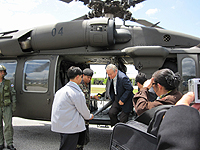
Arriving at the Army site near the Malaysian border.
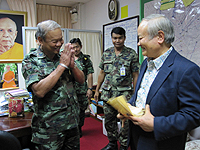
Paying a courtesy call on Lt. General Pichate
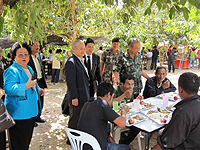
Trainees at lunchtime
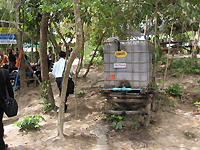
Cultivation tanks at the training center
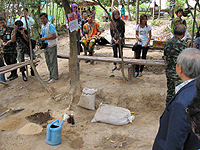
Lecture on how to make Bokashi
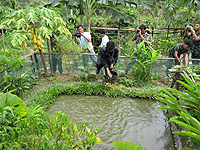
A catfish nursery, part of the “Self Sufficiency Economy”
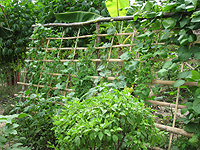
A self-supporting vegetable garden, also part of the movement towards a “Self Sufficiency Economy”
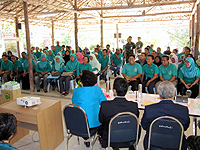
Leaders workshop in the Muslim region
Editor’s Picks
-
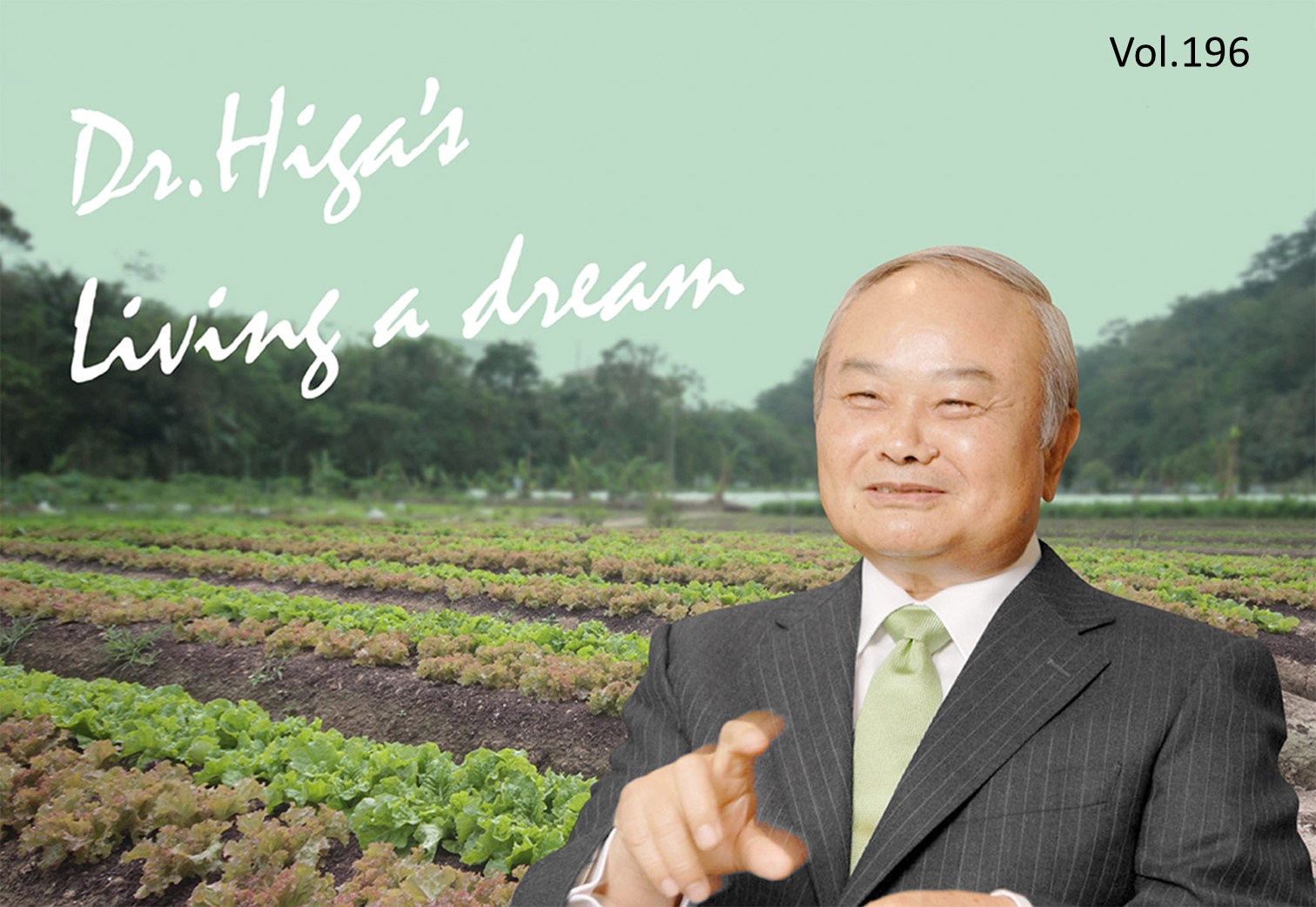
#196 The Steadily Evolving EM Nature Farming Method at the Blue Sky Palace - Part 6 -
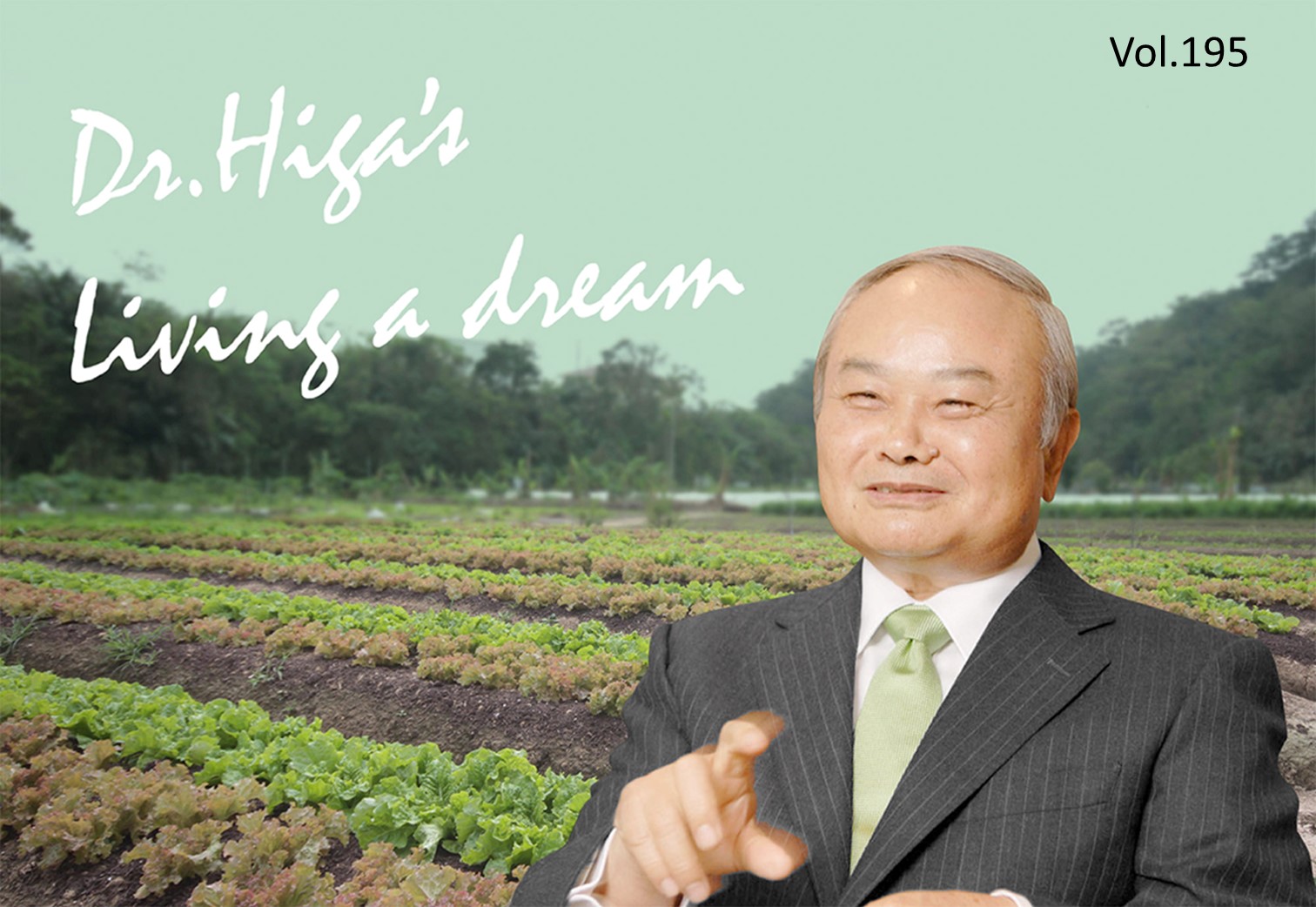
#195 The Steadily Evolving EM Nature Farming Method at the Blue Sky Palace - Part 5 -

#191 Steadily Evolving EM Nature Farming Method at the Blue Sky Palace -

#190 Quantum Mechanical Effects of EM Gravitron Charcoal
- 2025
- Apr:#204 How EM Use Has Spread Throughout the Philippines
- Mar:#203 How to Use EM to Fundamentally Solve the Problem of Agricultural Residue Burning
- Feb:#202 The Spread of EM technology in Germany
- Jan:#201 The 2nd Ichiro Masaki Memorial Universal Village EM International Conference
- Jan:#200 Cleanup of the Ala Wai Canal in Hawaii, where social bonds are strengthened using EM
- 2024
- Nov:#199 EM trials in India with bananas, tomatoes, and pomegranates
- Oct:#198 The Steadily Evolving EM Nature Farming Method at the Blue Sky Palace - Part 8
- Sep:#197 The Steadily Evolving EM Nature Farming Method at the Blue Sky Palace - Part 7
- Aug:#196 The Steadily Evolving EM Nature Farming Method at the Blue Sky Palace - Part 6
- Jul:#195 The Steadily Evolving EM Nature Farming Method at the Blue Sky Palace - Part 5
- Jun:#194 Steadily Evolving EM Nature Farming Method at the Blue Sky Palace - Part 4
- May:#193 Steadily Evolving EM Nature Farming Method at the Blue Sky Palace - Part 3
- May:#192 Steadily Evolving EM Nature Farming Method at the Blue Sky Palace - Part 2
- Apr:#191 Steadily Evolving EM Nature Farming Method at the Blue Sky Palace
- Mar:#190 Quantum Mechanical Effects of EM Gravitron Charcoal
- Mar:#189 The barrier space in Okinawa (Ryukyu Islands) has risen to another dimension
- Jan:#188 Sixty Days after Typhoon No.6
- 2023
- Oct:#187 Supermassive Typhoon No.6 and Subsequent Typhoon No. 11
- Sep:#186 Massive Typhoon No.6 that swallowed the Ryukyu Islands Graviton barrier
- Sep:#185 August 8th is World “EM Mudball Day”
- Aug:#184 A disease-free life depends on the health of the intestinal microbiome.
- Jul:#183 Trial and Error at the Blue-Sky Palace, Part 3
- Jun:#182 Trial and Error at the Blue-Sky Palace, Part 2
- Apr:#181 Trial and Error at the Blue-Sky Palace
- Mar:#180 Ala Wai Canal Cleanup Project in Waikiki, Hawaii
- Feb:#179 High-Yield, High-Quality Rice Production Using EM
- Feb:#178 The Progress the "Soil Preparation Workshop" of the Oishi 3-chan Club (Part 2)
- Jan:#177 Organic Farming Instructional Manual Using EM
- 2022
- Nov:#176 The Typhoon Situation in Okinawa in 2022
- Sep:#175 Third-Party Verification of the Graviton barrier in Okinawa Part-2
- Sep:#174 Third-Party Verification of the Graviton barrier in Okinawa
- Aug:#173 Ecosystem Changes Observed in Okinawa in 2021 Part-5
- Jun:#172 Ecosystem Changes Observed in Okinawa in 2021 Part-4
- May:#171 Ecosystem Changes Observed in Okinawa in 2021 Part-3
- Apr:#170 Ecosystem Changes Observed in Okinawa in 2021 Part-2
- Mar:#169 Koizumi Farm in Kamakura Continues to Evolve
- Feb:#168 Ecosystem Changes Observed in Okinawa in 2021 Part-1
- 2021
- Dec:#167 Enjoying EM Technology While Enriching the Local Ecosystem
- Nov:#166 A Case Study of the Use of EM in a Next Generation Free School in Tune with the Cycles of Nature
- Oct:#165 Typhoon conditions and flowers in Okinawa from August to October
- Sep:#164 Re-learning the origins of river purification using EM Cleaning up the Dairyuji River in Senami (Murakami City, Niigata Prefecture)
- Aug:#163 Measures Against Natural Disasters and Re-learning the Starting Point of EM
- Jul:#162 Summary of FFC (Foods for Children) Okinawa Forum 2021
- Jun:#161 Restoring the Vigor of an Old Tree and Purifying the Environment with EM Technology That Even an Amateur Can Do
- May:#160 The Public is Beginning to Recognize the Use of EM Smokeless Carbonizers
- Apr:#159 EM Hado (EM Graviton) that exerts quantum superposition effect over time
- Mar:#158 Virus-free Okinawan Plants Through Use of an EM Graviton Barrier
- Jan:#157 Enjoyable Farming for Self-Sufficiency that Even Amateurs Can Do
- 2020
- Dec:#156 EM quantum energy effect occurring in Okinawa
- Nov:#155 Implementing EM graviton farming as a flood countermeasure for apple orchards
- Oct:#154 The Latest Book on the Practical Uses of EM "You Are the One Who Draws Out the Power of Microorganisms," by Chizuko Nomoto
- Sep:#153 Application of EM technology to long periods of rain, lack of sunshine, storms, heavy rains, etc.
- Aug:#152 EM application in Kitanakagusuku village plant waste recycling yard
- Jul:#151 Natural Disaster Countermeasures Using EM Technology: Part 2
- Jul:#150 Natural Disaster Countermeasures Using EM Technology
- May:#149 How to make your home and workplace an energy spot by living a complete EM lifestyle: creating the ultimate source of health and environmental purification
- Apr:#148 EM, Viruses and the Pandemic
- Apr:#147 New agriculture applying quantum mechanics Part 2
- Apr:#146 New agriculture applying quantum mechanics
- Apr:#145 Wonderful EM Miracle
- 2019
- Nov:#144 The movie “Revival II” and the reality of Fukushima
- Oct:#143 Boundary dome and foliar spraying of EM・X GOLD and EM 3
- Oct:#142 Kirakira (Sparkling) Summer Vegetable Festa in 2019
- Aug:#141 Excessive salt inevitably causes salt damage
- Jul:#140 Diverse applications of charcoal Part 3
- Jun:#139 Diverse applications of charcoal Part 2
- Jun:#138 Diverse applications of charcoal
- Jun:#137 Purification power of salt
- May:#136 The degree of soil contamination is a reflection of the microflora
- May:#135 Definitive use of EM barriers to deal with typhoons
- May:#134 Implementing authentic Nature Farming
- May:#133 How to enhance healthy Hado (wave energy) by EM
- May:#132 Eating Dirt (Soil)
- May:#131 Hado (Wave energy) involved in health
- May:#130 Reaffirming EM technology to realize the essence of agriculture
- May:#129 The 2nd EM Producer Networking Meeting
- Apr:#128 Understanding the application of seawater and salt in crop cultivation
- Apr:#127 Prevention of Disasters by EM Technology
- Mar:#126 Quantum overlay effective utilization of EM
- Jan:#125 EM Disaster Recovery Support Projects in 2017
- 2018
- 2017
- Aug:#121 Escape from conventional agricultural traps
- Jul:#120 Limitation and important caveats regarding utilization of salt
- Jun:#119 EM Technology to Break Through the Limits of Pesticide-Free Strawberries
- May:#118 Application of barriers using EM rectification force
- Apr:#117 The 1st EM Produce Growers' Networking Conference
- Mar:#116 Sumizo kun: The Ultimate Versatile Carbonization Equipment
- Feb:#115 How to make and use simple carbonized and rectified ash
- Jan:#114 Achievements of 2016
- 2016
- Dec:#113 Definitive Measures Against Typhoons
- Nov:#112 International Conference on Universal Village
- Oct:#111 90% of Your Body is Microbes
- Sep:#110 Disaster Countermeasures Using EM
- Aug:#109: Changes in the Natural Environment by EM Barrier Domes in Okinawa
- Jul:#108: Multi-purpose Utilization of Activated EM with Seawater and Salt
- Jun:#107: Marine Day, when EM Mudballs and Activated EM are Applied Throughout Japan
- May:#106: The Function of EM and Gravitational Waves–Part 3
- Apr:#105: The Function of EM and Gravitational Waves–Part 2
- Feb:#104: The Function of EM and Gravitational Waves
- Feb:#103: The Importance of Phototrophic Bacteria in EM
- 2015
- Dec:#102: Results of Environmental Forum "Utsukushima EM Paradise" 2015
- Nov:#101: Environmental Forum "Utsukushima EM Paradise" 2015
- Oct:#100: A New Phase of Limit Breakthrough Using EM
- Sep:#99: A New Phase of Limit Breakthrough through EM
- Aug:#98: The Tokyo Bay Area Began Creating a Truly Livable Hometown
- Jul:#97: Rectifying Effects of EM
- Jun:#96: Lake Suwa Sousei lecture
- May:#95: In Order to Further Ensure Limit Breakthrough
- Apr:#94: Theatrical Release of the Documentary Film SOSEI-Revival to Enlighten People on the New Possibilities of Microorganisms
- Mar:#93: What Underlies Limit Breakthrough (Part 2)
- Feb:#92: EM Functions to Break Through Limits
- Jan:#91: At the Start of 2015
- 2014
- Dec:#90: Looking Back at 2014
- Nov:#89: Shikoku EM FESTA 2014, Virtuous Circle Conference in Matsuyama, Ehime Prefecture
- Oct:#88: Using EM to Deal with Weather Disasters (Part 2)
- Sep:#87: Current Status of Radioactivity Measures Using EM in Fukushima
- Aug:#86: APNAN (Asia Pacific Natural Agriculture Network) 25th Anniversary Conference in 2014
- Jul:#85: Using EM to Deal with Weather Disasters
- Jun:#84: Substantial Improvement of Soil
- May:#83: The Energy Rectification Force of EM
- Apr:#82: The Annual 18th EM Technology Exchange Meeting and Tohoku Conference in Shichigahama
- Mar:#81: Salmon going upstream in Kitaura (Kasumigaura)
- Feb:#80: The Microbiome Again
- Jan:#79: Inauguration of the Federation of Diet Members Who Use and Apply Effective Microorganisms
- 2013
- Dec:#78: Receiving an Honorary Doctoral Degree from Rajamangala University of Technology in Thailand
- Nov:#77: The Use of EM in School Education in Bhutan
- Oct:#76: Well of Bonding
- Sep:#75: The Background to EM Not Being Employed by Public Institutions to Deal with Radiation
- Aug:#74: Dealing with Disaster: Using EM in Crisis Management
- Jul:#73: EM Events on Ocean Day
- Jun:#72: Using EM to Deal With Heat Stroke and Summer Heat Fatigue
- May:#71: An EM Model Town in Malaysia
- Apr:#70: Steps the Japanese Government is Taking to Deal with Radiation: Are They Really Safe?
- Mar:#69: EM Group Disaster Reconstruction Aid Project in Fukushima
- Feb:#68: EM and Microbiomes (Microbial Flora)
- Jan:#67: A Necessary Evil is Still Evil
- 2012
- Dec:#66: The 17th National EM Technology Exchange Conference / Hokkaido Conference in Sapporo
- Nov:#65: EM Forum 2012 in Okinawa and the Environmental Forum in Fukushima
- Oct:#64: 2012 EM Forum
- Sep:#63: A New Earth Saving Revolution
- Aug:#62: The Asahi Newspaper’s Misguided Reports About EM
- Jul:#61: Using EM in Radioactive Contamination Measures in Fukushima Prefecture
- Jun:#60: The Effects of Using EM to Inhibit the Absorption of Radioactivity as Confirmed in Fukushima
- May:#59: Recovery Support for the Great East Japan Earthquake
- Apr:#58: The Royal Kingdom of Thailand, in which EM Functions as a Set Government Policy
- Mar:#57: Report on the Measures Taken by Kingdom of Thailand Using EM to Deal with Polluted Water
- Feb:#56 EM™ as Part of National Policy in Thailand to Deal with Sanitation Issues Resulting from the Flood of 2011
- Jan:#55 The Law of Syntropy (Revitalization)
- 2011
- Dec:#54 EM Forum 2011
- Nov:#53 Shikoku EM Festa 2011- Zenjunkan no Wa (Virtuous Circle) Tokushima Conference in Naruto -
- Oct:#52 The Mystery of Interim Safety Values for Radioactive Material
- Sep:#51 Successful Radiation Countermeasures Using EM
- Aug:#50 Events on Sea Day in which EM Mud Balls are Thrown into the Water and Activated EM is Applied.
- May:#47 Dealing with the Damage Caused by the Eastern Japan Earthquake
- Apr:#46 Eastern Japan Earthquake
- Mar:#45 The 16th National EM Technology Hokuriku Conference in Fukui
- Feb:#44 More Thoughts on Avian Influenza and Foot-and-Mouth Disease
- Jan:#43 Happy New Year!
- 2010
- Dec:#42 Shikoku EM FESTA 2010・Zenjunkan no wa (Virtuous Circle) Fellowship Conference in Tobe, Ehime Prefecture
- Nov:#41 EM Forum 2010
- Oct:#40: My Thanks to the EM™ Volunteers Who Helped in the Fight Against Foot-and-Mouth Disease in Miyazaki Prefecture
- Sep:#39 International EM Mud Ball Day
- Jul:#37 Poland EM Forum 2010
- Jun:#36 EM Countermeasures Against Foot-and-Mouth Disease
- May:#35 Abnormal Weather
- Apr:#34 EM Activities in Thailand: Finding Solutions to the Challenges Facing the Nation
- Mar:#33 New Developments in the Evolution of EMTM in Thailand
- Feb:#32 Results Starting to Be Seen at the Mikasa Project
- Jan:#31 Towards an EM-Use Society
- 2009
- Dec:#30 EM Summit
- Nov:#29 The System in Penang State in Malaysia that Made the World EMTM Mudball Day a Success
- Oct:#28 The "World EM Mudball Day" in Malaysia
- Sep:#27 Validating EMTM Medicine: Case Study Reports from EM Users 2009. (Part 3)
- Sep:#26 Validating EMTM Medicine: Case Study Reports from EMTM Users 2009. (Part 2)
- Jul:#25 Validating EMTM Medicine: Case Study Reports from EMTM Users 2009. (Part 1)
- Jun:#24 Activities to Disseminate EM-Focused Nature Farming in China
- May:#23 Use of EMTM in Response to Swine Flu
- Apr:#22 Using EM to Solve Public Administrative Costs
- Mar:#21 Reaffirming the Versatility of EM
- Jan:#20 The Beginning of a New Era
- 2008
